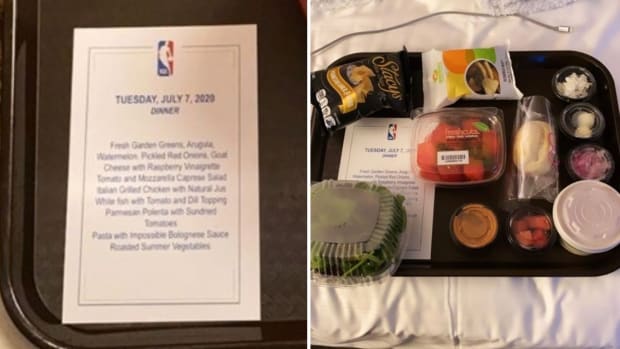Chef David Chang on Korean Cuisine And His Role as Olympic Food Correspondent
Michelin star chef, internationally acclaimed restaurateur and now Olympic food correspondent, David Chang—the man behind the Momofuku culinary empire—will share his insight into Korean cuisine throughout NBC's coverage of the PyeongChang Games next month. SI Eats talked to him quickly about his new assignment, being yelled at by coaches and what makes the best stadium food.
On the events he's most excited to follow: I'll be rooting for fellow Korean-American [snowboarder] Chloe Kim, who is on fire right now. But the sport that I actually want to follow is biathlon because I tried it once, and it is so goddam hard. Last year, in Vancouver, we did a cross-country ski and then practiced shooting—it was obviously a shortened version—but it gave me insight into how ludicrously impossible the biathlon is.
On his mission as a food correspondent: A lot of America probably thinks Korean cuisine is a lot like Chinese and Japanese food; maybe they lump it all into this pan-Asian category. And what I hope to show is that it's distinctly different, that it has its own history. Food is often the best way to understand a culture, and now more people care about food than ever before.
On his greatest athletic achievement: I was a pretty good golfer, good enough to flame out by the time I was 13. But my greatest athletic moment was being named all-league at right tackle my senior year of high school. I mean, let's put this into context. This was limited to private school kids around Washington D.C., not exactly top talent. And the only reason I say that is because I never thought it would happen—mostly because my coaches always yelled at me about how bad I was.
On the state of stadium food: It has never been as good as it is now. It's so diverse, from sushi to concoctions ramming as many calories and fat into a single dish as possible. But I think the benchmark for stadium food is something that is handheld. And you want to make sure it's really good by the time you get it to your seat. That's one of the reasons why we did the chicken sandwich [at Fukurestaurants in New York's Citi Field and Madison Square Garden and Miami's Hard Rock Stadium] because it travels really well. And ... I'm a big fan of anything that's a fried chicken product in a stadium.
RECIPE: MOM'S SHORT RIB MARINADE
Ingredients:
1 1/2 cups pear or apple juice
1 cup sake
1 cup mirin (sweet Japanese rice wine)
1/2 cup sugar
1 cup soy sauce
a Freshly ground black pepper
2 Tbsp. chopped garlic
10 garlic cloves, crushed
1 Tbsp. sesame oil
2 Tbsp. grapeseed or other neutral oil
4 to 5 lb. short ribs
Salt
2 large onions, peeled and roughly chopped
1 lb. carrots, peeled and cut into chunks
8 to 12 small potatoes, preferably fingerlings, trimmed
1/2 cup chopped scallions
4 cups cooked white rice
Directions:
Preheat the oven to 350 degrees. Make the braising liquid: In a saucepan, combine the juice, sake, mirin, sugar, soy sauce, about 20 grinds of pepper, both forms of garlic, sesame oil, and 11/2 cups of water. Bring to a boil, then simmer.
Put the grapeseed oil in a large ovenproof braising pan or skillet over medium-high heat. Season the ribs liberally with salt and pepper, then add them to the pan. Brown well on one side, moving them around to promote even browning. Turn, add the onions, and brown the other side, stirring occasionally.
Arrange the ribs in the pan, bone side up. Carefully pour the braising liquid on top; the ribs should be submerged in the liquid (add water or juice if necessary). Place the pan in the oven and bake uncovered for two hours. Add the carrots and potatoes to the pan. Cook two more hours, or until the meat falls from bones.
Cool the ribs in the braising liquid for one hour, then remove. Strain the liquid from the meat and vegetables. At this point, the ribs and liquid can be covered and refrigerated overnight.
Remove the bones from the ribs. In a pot, combine the meat and vegetables with the braising liquid. Heat to a boil, then simmer, reducing the liquid until syrupy. If it seems too thick, thin with a bit of water.
About a half hour before you are ready to serve, taste the mixture and adjust seasonings if necessary. Garnish with scallions and serve on rice.
Recipe courtesy of David Chang of Momofuku.




